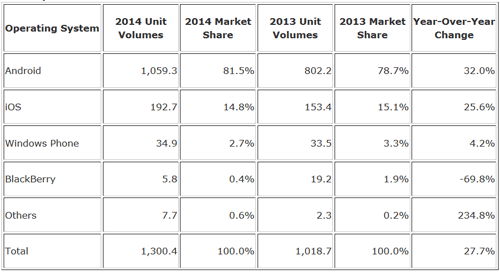News
Windows Phone Remained a Distant Third in 2014
- By Gladys Rama
- February 24, 2015
The worldwide smartphone market continued to be dominated by Google Android in 2014, leaving other platforms -- including Microsoft's Windows Phone -- to fight for scraps.
Android shipped on 1.06 billion devices in 2014 -- more than the total number of smartphones that were shipped in 2013 -- and accounted for 81.5 percent of the global market, according to data released Tuesday by research firm IDC. Android also grew faster than the overall smartphone market, increasing its shipments by 32 percent between 2013 and 2014 (by contrast, total smartphone shipments grew by only 27.7 percent year over year).
Its closest competitor was Apple iOS, which shipped on 192.7
million devices and made up 14.8 percent of the market. Driven by interest in the iPhone 6 and iPhone 6 Plus, iOS shipments in 2014 grew by 25.6 percent year over year.
In third place was Windows Phone, which had the slowest year-over-year growth (4.2 percent) of the top three platforms. Windows Phone shipped on 34.9 million units and captured 2.7 percent of the market in 2014.
 [Click on image for larger view.]
Top four smartphone operating systems, unit shipments (in millions), market shares and year-over-year growth for calendar year 2014. (Source: IDC.)
[Click on image for larger view.]
Top four smartphone operating systems, unit shipments (in millions), market shares and year-over-year growth for calendar year 2014. (Source: IDC.)
"Instead of a battle for the third ecosystem after Android and iOS, 2014 instead yielded skirmishes, with Windows Phone edging out BlackBerry, Firefox, Sailfish and the rest, but without any of these platforms making the kind of gains needed to challenge the top two," said IDC Senior Research Manager Melissa Chau in a prepared statement.
IDC's analysis suggested that Windows Phone's performance in 2015 will depend on whether it can gain traction in the higher-end smartphone market instead of the lower end, which has traditionally been the domain of Android.
"Having finalized its acquisition of Nokia in the spring of 2014, Microsoft relied primarily on a long list of entry-level Lumia devices to maintain its position in the market, and relied on its partners HTC and Samsung to provide cover on the high-end of the market," the firm said. "With the launch of Windows 10 later this year, Windows Phone stands to make a more concerted effort to return to the high end of the market."
Windows 10, Microsoft's forthcoming desktop operating system that will also run (as a different SKU) on small tablets and smartphones, is expected to be released this fall. A technical preview of Windows 10 for smartphones became publicly available earlier this month, though it supported only a very limited number of low-end Lumia devices. Microsoft explained that future preview builds will have a "partition stitching" feature that will enable them to run on higher-end phones.
"Until this [feature] comes in, we needed devices which were configured by mobile operators with sufficiently sized OS partitions to allow the in-place upgrade, and many of the bigger phones have very tight OS partitions," the company said.